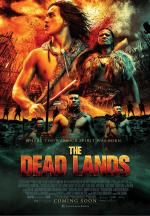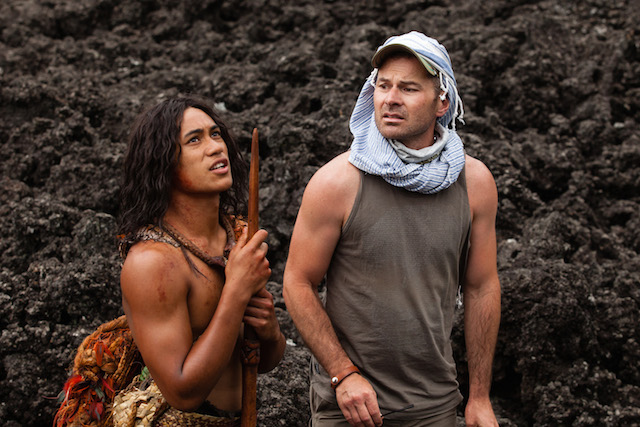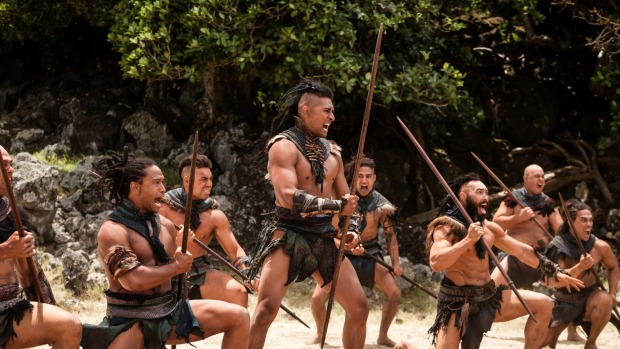Interview: Toa Fraser and the 'Cool Runnings' of the foreign language race.
 Wednesday, December 3, 2014 at 10:17PM
Wednesday, December 3, 2014 at 10:17PM  Glenn here. If you had ever wondered what a pre-colonial New Zealand western may look like, Toa Fraser's The Dead Lands just may be it. The film's story of revenge taken by a Maori chieftain's son after the slaughter of his tribe and family is very typical fodder for the western genre, but with its use of indigenous languages (a language that itself has been slaughtered throughout history) mixed with local mythology and lore, the film proves an entirely unique proposition. It's only the third foreign language submission in the small island nation's history, and the first to be set before white settlement. I spoke to the director last week, just a few days before his film received the biggest haul of nominations at the New Zealand Film Awards. The Dead Lands received 14 nominations and will face stiff competition from the inspirational chess drama The Dark Horse with 13. We talked about about the festival circuit, Oscar campaigning, being the underdog, historic authenticity, costuming and more.
Glenn here. If you had ever wondered what a pre-colonial New Zealand western may look like, Toa Fraser's The Dead Lands just may be it. The film's story of revenge taken by a Maori chieftain's son after the slaughter of his tribe and family is very typical fodder for the western genre, but with its use of indigenous languages (a language that itself has been slaughtered throughout history) mixed with local mythology and lore, the film proves an entirely unique proposition. It's only the third foreign language submission in the small island nation's history, and the first to be set before white settlement. I spoke to the director last week, just a few days before his film received the biggest haul of nominations at the New Zealand Film Awards. The Dead Lands received 14 nominations and will face stiff competition from the inspirational chess drama The Dark Horse with 13. We talked about about the festival circuit, Oscar campaigning, being the underdog, historic authenticity, costuming and more.
You have recently played at Toronto and London film festivals, and now you're a submission for the Oscar, how have these last few months of yours been taking this film around the world.
It's been amazing. We only finished the movie a few weeks before we went to Toronto and I had only seen it once in its entirety before we screened it at Toronto so it was kind of a high stakes game. We had, I think, six cast members come to Toronto and be a part of the experience, so it was a great premiere and we were very happy with the way that it was received. We were very grateful. And then to get back to London for the festival was also great. We had a great big group of Maori come down to the show and stand proudly at the side of the stage without telling us they were coming. They all had a great time. And then back to New Zealand for the premiere there, so it's been a bit of a whirlwind, but I am very proud of the movie and love talking about it. Good times.
Have you by any chance been given any education on campaigning techniques when it comes to the Oscar? Is it a big deal in New Zealand or do you take it stride?
We are the Cool Runnings of the foreign language race [laughs]. You know, I think we're only the third ever from New Zealand…
Yeah, it is, after The Orator (2011) and White Lies (2013).
Yeah, and we're up against some formidable and very established industries that make movies in languages other than English. So, we under no pretense we have… we're the underdog in this game, but in terms of strategy? No. I understand there are very strict rules and so I'm anxious not to suck up. We're from New Zealand, we're very play by the rules types.
More on Peter O'Toole, costumes, and action choreograhy after the jump...
 James Rolleston, Lawrence Makoare and Toa Fraser on the set of 'The Dead Lands'
James Rolleston, Lawrence Makoare and Toa Fraser on the set of 'The Dead Lands'
I really love it when predominantly English-speaking countries like my own, Australia, make films in their indigenous languages, but did you find any resistance to using the indigenous Maori language? You also cast actors known only to local audiences, and given your first two films had actors of Peter O'Toole (in Dean Spanley) and Ruby Dee's (in No. 2) caliber, did anybody try to convince you to make the film in English with bigger names?
Our producer Matthew Metcalfe and I had a conversation that lasted about five minutes about whether or not we should do it in English, which was definitely a more viable option. Many, many movies over the long history of English-speaking cinema have been made when English language is not necessarily the most appropriate language to do it in, so there was a strong argument to do it in English, but we both thought it would be… cooler, and make for a more unique experience if we were to do it in Maori. And, to be honest, from what I understand, the fact that we were shooting it in Maori actually made it a more appealing prospect internationally. It made it more exciting and more unique to festivals.
Over the years there has been precedence with the films of Mel Gibson (Apocaylpto, The Passion of the Christ) to make films in this way. And the idea of the first New Zealand foreign language Oscar is an appealing prospect. There was also a Maori-language production of Troilus and Cressida at The Globe in London as a part of their Shakespeare festival and a lot of the cast involved in that ended up being involved in The Dead Lands and I was kind of inspired by what they were doing at the time.
Was the screenplay (by Glenn Standring) written in Maori?
It was written in English, but it had on the title page that it was intended to be translated into Maori and we worked with Scotty Morrison who's one of the world's best Maori language speakers to do the translation.

How were the actors with the Maori language? Is it commonly used in New Zealand?
Maori, as I'm sure you're aware, is a language that has undergone incredible trauma over the years and only really in the last 30 years or so has there been a very concerted effort to put in place Maori languages in schools and in broadcasting and in other various ways and make the Maori language more mainstream. But the language confidence of the some of the stars… not all of them were major speakers so they had to not only go through a great physical transformation, but had to learn confidence to speak in Maori as well. But at the same time, in the case of some of our actors, Maori is their first language.
And we made the movie in a Maori way as well. We put in place protocols where we would say Karakia, a prayer every morning and at the end of every day and that was as much a cast-building exercise as anything else. We had a bootcamp for the actual physical training, but the cast decided they wanted to come together with the crew every day and proper a Maori sensibility and it was really fantastic.
One of my favorite elements of the film was the costume design by Barbara Darragh. So many period films dress characters up in costumes that look brand new, but these ones felt very authentic and lived in. I am assuming that deliberate, but how did you go about researching this very ancient costume look to get it just right?
Well, Barbara is a really wonderful designer and was very confident in her own vision and ability to develop things in her work that worked with our milieu. I'm pretty sure there's never been a pre-colonial Maori story made in New Zealand before so we were making something that we had almost no visual reference to at all, which was a real challenge.
I was really thrilled with the outcome. You know, Barbara and I and (production designer) Grant Major worked together as a trio figuring out the look of the film. We obviously wanted the production design to work in tandem with the costumes very strongly, but we walked a tightrope between tradition and innovation. A lot of the costumes are very traditional and Barbara did a lot of research, but at the same time a lot of the costumes are very innovative and we made some bold choices with the haircuts as well and things like that.
Is there are lot in the history books to research?
There's actually a very strong oral tradition, and in the last 100 years there has been photography, so in a way there are little bit, but at the same time we didn't want to make it in a particularly anthropological way. We wanted to make it a sort of cool, action movie.

Speaking of cool action, my favourite scene was the battle sequence mid-way through the film. Could you go into how that scene was choreographed and made?
That was our benchmark fight and it was challenging in so many different ways. The fact that it was outdoors and filmed over five days and it's a time-continuative sequence so the light was changing every day and continuity was very difficult to achieve. But also the choreography was a very intimidating situation for Lawrence [Makoare] because he had to undergo a great physical transformation and this was the first fight that we short, so he was facing off against these 20 guys and, you know, being asked to pull of this this real f***ing kick-ass fight. It was challenging for him it was something crazy like 160 different beats that he had to learn. They all put in a lot of effort, but it all came together.
What has the local reaction been to the film?
It came out a few weeks ago and it was number one at the box office in the first week, which was… well, New Zealand's had a great year with movies like The Dark Horse.
I've read multiple articles comparing New Zealand's box office success to Australia's, because our films have not had a good year. Except for Wolf Creek 2.
Success moves in a sort of roundabout way, but for me the more exciting thing has been the way it has been embraced by Maori audiences. I was nervous about that. And obviously premiering in Toronto, but I was more nervous about how it was going to be received at home, but it's been great seeing the movie be embraced and the fact that a movie like this could be made.
Thank you very much and good luck.
Great, thank you Glenn.

Related articles: Foreign Language Oscar charts | Interview with Brazil's Daniel Ribiero (The Way He Looks) | Interview with Switzerland's Stefan Haupt (The Circle)



Reader Comments (1)
Man it would be amazing if this was nominated but very much unlikely!